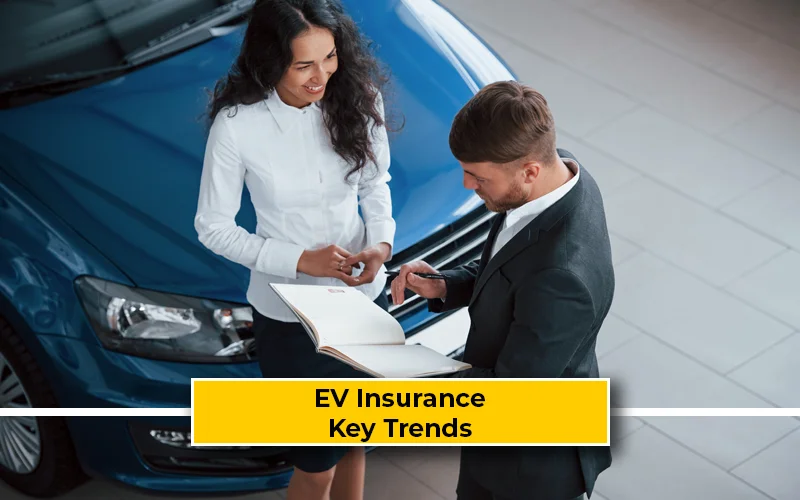The Future Of EV Insurance In India – Key Trends To Watch
The Indian automobile market is undergoing one of its most significant transformations in several decades, i.e., the shift to electric mobility. From bustling metro streets to smaller towns, electric vehicles (EVs) are becoming more visible, and with them, a new sector of the auto industry is booming: EV insurance.

While motor insurance for petrol and diesel cars has remained stable over the years, Electric vehicles bring new challenges and opportunities for insurers. EVs have unique components like high-value lithium-ion batteries, complex electronics and advanced software, which make insuring them a completely different ball game. In the coming years, these differences will likely become more prominent.
Here are the key trends shaping EV insurance in India.
16x Growth in EV Insurance Demand in 3 Years
The EV insurance demand in India is increasing at a strong pace. Data indicates that EV insurance policies went up from just 0.5% in FY23 to 14% in FY25. In the financial year 2025-26, we are already at over 8.2%. The number of insured electric two-wheelers has also doubled from ~10,000 last year to ~20,000 this year. Metropolitan hubs such as Delhi-NCR, Bengaluru, Chennai and Pune account for around 55% of these policies purchased.
Tailored EV Insurance Add-Ons for Enhanced Protection
With an EV, traditional car insurance isn’t enough. One of the most expensive EV components is the battery, which makes up 40–60% of their value. Thus, battery protection cover is currently one of the most popular add-ons in EV insurance.
Have a look at some other EV insurance add-ons that are worth considering:
- Charger and home charging station cover covers theft or damage to charging units
- Software protection for firmware issues or cyber-attacks on connected car systems
- Zero depreciation cover ensuring parts are replaced at full cost without accounting for wear and tear
- Roadside assistance tailored for EV-specific issues like battery depletion
Usage-Based Insurance Models
Another highlight is the shift towards smart and flexible car insurance options, known as Usage-Based Insurance (UBI). Thanks to telematics and connected car technology, insurers can track driving habits, mileage and charging patterns.
Pay as you Drive (PAYD) or Pay how you Drive (PHYD) insurance offers flexible coverage. The premium prices for these types of car insurance are based on how much you drive and how safe you drive. This type of insurance is most beneficial for those who drive less or have multiple cars with less usage. Besides helping vehicle owners save money, UBI encourages safer and more eco-conscious driving habits.
AI-Driven Personalization in Insurance
Insurers are leveraging the sustainability of EVs, and a lot of them now offer discounts for:
- Using renewable energy for EV charging
- Maintaining a low annual mileage
- Participating in eco-driving programs
AI is playing a pivotal role in the underwriting process. By analyzing driver behavior, traffic conditions and vehicle data, insurers are now able to curate highly personalized insurance covers. This not only reduces risk but also improves the customer experience with proactive maintenance notifications and quicker claim settlements.
Regulatory Push and Public-Private Partnerships
The Indian government is actively supporting comprehensive insurance options for EVs via regulatory changes and financial incentives. Recent initiatives like the battery-swapping policy and proposed mandates for EV-specific coverage are creating an environment where insurance is not only mandatory but also tailored to the fast-changing EV technology. There is an increasing partnership between insurers, automakers, and charging infrastructure providers to offer easy and convenient insurance solutions for EV owners.
FASTag Integration — Insurance Meets Charging
In a forward-looking development, the Ministry of Road Transport and Highways (MoRTH) is exploring to expand FASTag usage beyond tolls to include EV charging payments, parking fees and even insurance transactions.
Once implemented, there would be a single payment interface for several aspects of EV ownership, thus simplifying life for EV owners and integrating insurance renewals or claim processes with everyday vehicle operations.
What All This Means for EV Buyers in 2025?
If you’re considering to buy an EV, here’s why these insurance changes matter:
- Better protection for high-cost EV components
- More flexible pricing models that reward safe and sustainable driving behaviour
- Greater clarity thanks to standardized guidelines from IRDAI
- Easier integration of car insurance with charging and maintenance
What to Look at While Buying EV Insurance?
Electric vehicle insurance provides enhanced protection for the EV's battery, including extended warranty, coverage for consequential losses and damage caused by water. While buying EV insurance, consider opting for add-on covers which offer extended protection against damage to owned charging stations and charging accessories. One valuable add-on is for motor protection, which covers electrical system failures, wiring damage and motor burnout, all of which are expensive to repair.
Since electric vehicles rely heavily on sensors and cameras, there is a need to offer protection against these sensitive parts of the EV. Many insurance companies are wary of underwriting as the potential risk and vehicle damage is higher since EVs are zippier than ICE-based vehicles.
This implies faster acceleration, and with sensitive components and wiring like cameras, sensors, etc., there is a higher chance of a frontal impact or a dent on a sensitive part of the electric vehicle. Some more relevant add-on covers are likely in the future, given the rapidly increasing penetration of EVs in India.
The Bottom Line
The future of EV insurance in India is being shaped right now. Insurers are tailoring their offerings to meet the needs of a rapidly surging customer base of electric vehicles. For those researching their next electric car, understanding these EV insurance shifts is just as important as knowing battery ranges or charging times. After all, the optimal car insurance could be the difference between a smooth ride and an expensive pit stop.
Also Read: Find Out The Benefits Of Owning An EV
Disclaimer: The views, opinions or facts expressed in this article are solely those of the guest author or contributor. These opinions do not represent those of V3Cars and/or those of V3Cars’ representatives or authors.


Thank you for sharing such informative content. This blog provides valuable insights and is very helpful for readers. If anyone needs more guidance or wants expert support in choosing the right insurance plan, they can connect with SecureNow for reliable assistance.